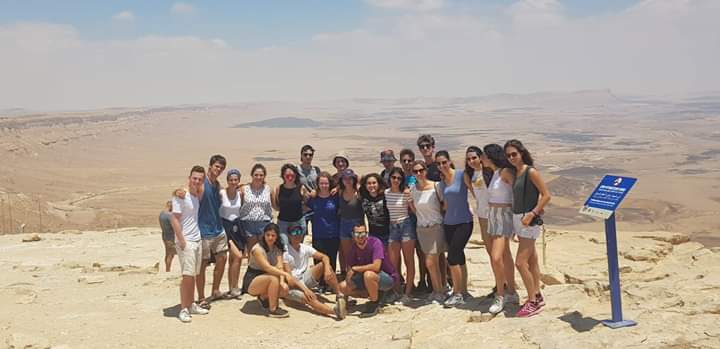
27 Oct Day 6: The desert that you don’t expect
The desert encourages you to reflect on your assumptions, it puts you in contact with something you haven’t felt before, it makes you experience all its magic.
It’s morning again, we get on the bus and we leave for the desert.
On the way we find a kind of desert that is very different from what we had expected: in our mind there is a never ending expanse of sand, here instead there are mountains, rocks and stones.
We get to a very important museum for the Israelis, the remembrance museum of the astronaut Ilan Ramon; we start a visit that allows us to enter in contact with the astronaut and his story, as well as with the morphology and the wildlife of the area.
The visit continues till the last two rooms where we are told about Ilan Ramon’s space expedition and the incident that lead him to his death. The story ends with a surprise effect: in front of us the curtain opens and leave room to an almost 180 degrees view of the desert. At this point the stereotype of the desert that we had in our mind finally crumbles as the landscape is not made of orange dunes but of deep and arid canyons that expands endlessly till touching the horizon.
The trip continues and we get to the second destination, the tomb of the one who was the prime minister of the young State of Israel.
Here we are told the story of David Ben Gurion, an example of leadership for his ability to undertake his role as prime minister; an example of courage for having founded the State facing many obstacles and an example of humility for having decided to live in the desert. His political programme, in fact, entailed the improvement of the Southern areas of the country that, even now, are poorer and not that much inhabited; hence his move right to that areas was surely an example for his fellows citizens.
Following this stop we finally end up at the Beduin tent and, once again, our expectations crashes with the reality of things, as the place where we were ment to spend the night looked like a village, while we were expecting a medium size tent with nothing around.
Following a short exploration of the village, in pairs we get on camels and started a short walk between the rocks.
Hence we have dinner: in the tent-canteen we start getting accostumed to the culinary habits of the Bedouins, we eat seated on materasses on the ground and we are given a big plate of cous cous, chicken, chickpeas and other food that everyone picks as liked. The meal is accompanied by interesting discussions about religion, the divisions within the State, and politics; a discussion that encourages us to go beyond our midset so to embrace a new one.
At the end of the dinner we discover a surprise made by the Israelis and we walk towards our tent, curios and excited.
We are directed towards a tent that isn’t actually ours where we meet a man wearing the traditional Bedouins clothes; this man invites us to take a seat and starts telling us about his traditions: he explains to us the traditional habit of welcoming hosts, the old techniques of man-woman courtship and how it is different today. While he speaks to us we are offered the Bedouin coffee and the as per the traditional habits.
The evening continues with a highly emotional moment…a bonfire, sitting in circle with a guitar and a hukulele, singing, smiling and making stronger a relationship that gets more and more special, day after day.
The magic terminates with the song “Hallelujah”, and it’s an hallelujah full of happiness for a dream that came true: we are in Israel, where LEAD started; we met fantastic young Israelis, very similar to us, with a big heart and lots of energy; we admire the beauty of places for which people have fought for centuries; we have the opportunity to challenge us by meeting new cultures, new mindsets and a different reality.
Following this fabulous moment of union and sharing, we decide to go to see the desert at night, hence we walk and the more we move away from the light and the tent, the more we see a long expanse opening in front of us, enlightened by the moon and we feel that feeling of being lonely with those who, by now, are our Israeli brothers and with ourselves. To live this feeling in full, we decide to keep silent and, who wishes so, to separate from the others to fully feel the magic of the desert. In that moment someone looks thoughtfull up to the stars, closes his eyes and feel the wind and the smell of the air; others meditates looking for their own spirituality. More than ever, we are firm on the idea that the desert is able to amplify any emotion, and that it’s a place where the most simple thing becomes meaningful.
Greta De Stefani
